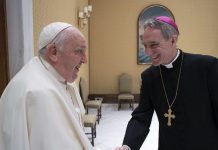Few things are as harmful as calling good evil or taking a virtue for a vice, and certainly, naming the ungodly a Saint…
Newsroom (26/10/2022 12:15, Gaudium Press) “Prudence, how many crimes are committed in your name!” This is a fair paraphrase of Madame Rolland’s saying, which well deserves to be remembered in our days.
Indeed, history lends itself to many parallels, and the more interesting they are, the less obvious they are to the superficial eye. Thus, the concept of prudence, in our days, seems to undergo a process analogous to the one that freedom suffered in the times of the French Revolution. Let us examine it.
In those days, society’s Utopia was liberty – but even more, it was a mockery of liberty, since that society longed for so many things labeled as liberty, but deep down, it sought an anarchic state of things.
To obtain it, according to this distorted vision, freedom became a justification for the use of all means – licit and illicit – in the conquest of this end. However, we know well that the paradox was flagrant, for what was accomplished in this period if not an upsurge of oppressions, revolts, and punishments? Truly, freedom had never been so far removed!
But what caused this result? That which was sought, then, was not liberty – meaning the capacity to do good – but libertinism, which is the permission to practice evil, and which then generates chaos.
In this sense, something quite similar is taking place within humanity today. “Peace, peace, peace!” For that, they cry, “Prudence, prudence, prudence!” Who can escape hearing this preaching?
Despite all of this, where is the actual peace? And, to our astonishment, where is prudence?
Right means to right ends
A pseudo-pacifist will say: “Peace is being sought everywhere, as long as prudence is being practiced!” It is an equivocation as dangerous as that which was spread at the time of the French Revolution, in analogy with the search for freedom; in our days, many call peace inaction, and, prudence, imprudence.
Peace, according to St. Augustine, is “tranquilitas ordinis”; ‘the tranquility of order‘; libertinism, on the other hand, is a period of calm amidst the chaos. Is it the art of retreating in the face of evil?
Aristotle specified the natural virtue of prudence as “right reason in doing”. St. Thomas, for his part, defined it as “a special virtue infused by God into the practical understanding for the right government of our particular actions in the order of the supernatural end.”
From both definitions, one draws the understanding that prudence consists in choosing the right means for the attainment of a correct end. Therefore, where the means is not just, there is no true prudence; and where the end is not right, this virtue will not be present.
If this is so, the “pseudo-prudence” of our century, that frantic neglect to defend the good through the shield of cowardice or laziness, has been the mask for many in these historic times.
But where will this slow and “prudent” march towards imprudence take us? May the prudent reflections of our readers lead them to answer well and, above all, to choose well the paths of the authentic virtue of prudence, even at the expense of personal comforts.
By Thiago Resende
Compiled by Sandra Chisholm









































